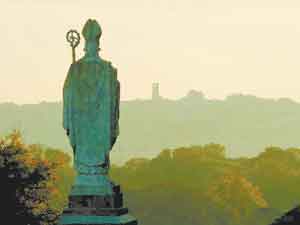 I arise today
I arise today
Through a mighty strength, the invocation of the Trinity,
Through a belief in the Threeness,
Through confession of the Oneness
Of the Creator of creation.
I arise today
Through the strength of Christ’s birth and His baptism,
Through the strength of His crucifixion and His burial,
Through the strength of His resurrection and His ascension,
Through the strength of His descent for the judgment of doom.
I arise today
Through the strength of the love of cherubim,
In obedience of angels,
In service of archangels,
In the hope of resurrection to meet with reward,
In the prayers of patriarchs,
In preachings of the apostles,
In faiths of confessors,
In innocence of virgins,
In deeds of righteous men.
I arise today
Through the strength of heaven;
Light of the sun,
Splendor of fire,
Speed of lightning,
Swiftness of the wind,
Depth of the sea,
Stability of the earth,
Firmness of the rock.
I arise today
Through God’s strength to pilot me;
God’s might to uphold me,
God’s wisdom to guide me,
God’s eye to look before me,
God’s ear to hear me,
God’s word to speak for me,
God’s hand to guard me,
God’s way to lie before me,
God’s shield to protect me,
God’s hosts to save me
From snares of the devil,
From temptations of vices,
From every one who desires me ill,
Afar and anear,
Alone or in a mulitude.
I summon today all these powers between me and evil,
Against every cruel merciless power that opposes my body and soul,
Against incantations of false prophets,
Against black laws of pagandom,
Against false laws of heretics,
Against craft of idolatry,
Against spells of women and smiths and wizards,
Against every knowledge that corrupts man’s body and soul.
Christ shield me today
Against poison, against burning,
Against drowning, against wounding,
So that reward may come to me in abundance.
Christ with me, Christ before me, Christ behind me,
Christ in me, Christ beneath me, Christ above me,
Christ on my right, Christ on my left,
Christ when I lie down, Christ when I sit down,
Christ in the heart of every man who thinks of me,
Christ in the mouth of every man who speaks of me,
Christ in the eye that sees me,
Christ in the ear that hears me.
I arise today
Through a mighty strength, the invocation of the Trinity,
Through a belief in the Threeness,
Through a confession of the Oneness
Of the Creator of creation.
— St. Patrick (ca. 377)
Catholics in Latin America and throughout the world celebrate the life and ministry of St. Turibius of Mogrovejo on March 23. The 16th century bishop upheld the rights of Peru's indigenous peoples, and became one of the first canonized saints of the Americas.
Turibius was born in Spain during 1538, to a noble family in the kingdom of Leon. Even as a child, he frequently prayed, fasted and gave to the poor, and he eventually developed the daily habit of praying the rosary along with the Little Office of the Blessed Virgin Mary.
He went on to study law at the University of Salamanca and eventually served as a judge for five years in the territory of Granada. His judicial wisdom and diligence drew the attention of King Philip II, who wanted Turibius – who was still a layman – to be consecrated as a missionary archbishop for the Spanish colony of Peru.
Turibius became greatly dismayed, protesting to the king and Church authorities that he was not even a priest and could not possibly accept the charge. In a series of letters, he pleaded that he was not personally capable of serving as the archbishop of Lima – nor, he reminded them, did canon law permit a layman to become an archbishop.
Eventually, however, he had little choice but to comply. The 43-year-old was consecrated as a bishop in 1581 and immediately left for Lima, Peru.
The new archbishop undertook to travel throughout the rugged and mountainous diocese, where he observed many of the worst effects of colonialism – both upon the enslaved and oppressed natives, and on many of the colonists who seemed to have lost their souls in the pursuit of wealth.
He responded with constant prayer and penance as he traveled throughout his territory administering the sacraments, teaching the Catholic faith and establishing schools, seminaries and hospitals.
To the indigenous Peruvians, the archbishop was a herald of the Gospel who held their lives as more precious than their country's supplies of gold and silver. But to the many colonists whose behavior showed no sign of their Catholic origins, he was a prophetic scourge – whose efforts to awaken the public conscience earned him rebukes and opposition.
Turibius ultimately managed to make three visitations of his diocese, under rugged and dangerous conditions, which occupied about half of his 25 years as archbishop of Lima. He united the Peruvian Church at an administrative level by holding several local councils of its clergy, but he was also known to spend days traveling to reach a single person with the message of Christ.
The archbishop became seriously ill in 1606. He sensed that his death was imminent, and he decreed that his possessions should be distributed to the poor. St. Turibius died on March 23, and his body was found to be incorrupt the next year. He was declared a saint in 1726, and is now regarded as the patron of native peoples' rights and Latin American bishops.
— Benjamin Mann, Catholic News Agency

